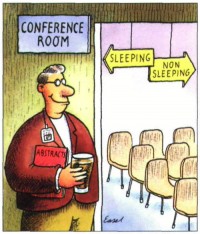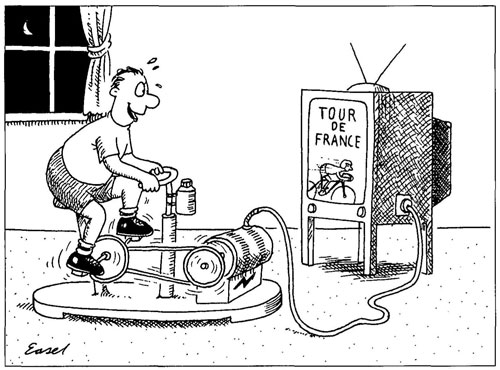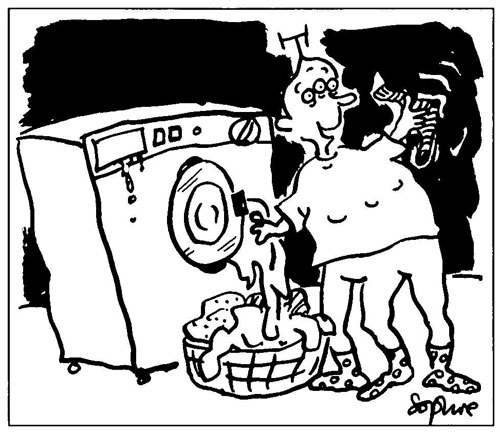By Margaret Harris
This is the second in a series of blog posts about “Lateral Thoughts”, Physics World’s long-running humour column. You can read the first one here.
The Lateral Thoughts column of humorous, off-beat or otherwise “lateral” essays has been part of Physics World ever since the magazine was launched in October 1988. In my previous post about the column’s history, I described some ways that Lateral Thoughts have changed since the early days (tl;dr version: loads of sexism, side order of class conflict). But in my trawl through the archive, I’ve also discovered that some things haven’t changed very much at all over the past quarter-century.
Take scientific conferences. In a Lateral Thought entitled “How to survive a conference”, the materials scientist Brian McEnaney advised speakers that “a scientific audience is like a pack of wild animals – they can smell fear at a hundred yards”. Reacting aggressively to audience members is not, however, recommended: “If some old duffer points out that your approach merely duplicates his classic work with Waffle and Wordmincer in 1952…it is completely the wrong response to leap off the podium and wrestle him to the floor.” Instead, McEnaney suggests replying “‘That is the traditional view of the subject, but recent work points in a completely different direction.’ Notice that you have not actually contradicted him, but you have managed to imply that he has not read the literature for 30 years.”

Reading this, I thought I must have been at the same conference. However, given that I was still in primary school when McEnaney’s article was published back in May 1989, that seems unlikely.
By January 1997, conference-based humour had evolved from “how to survive” to “how to succeed”. In his Lateral Thought on the subject, polymer scientist Phil Kline recommended that conference attendees “try to arrive at least half a day late…to convey the impression that you have just rushed in from another, infinitely more interesting conference at some exotic location overseas”. Then, at the conference dinner, Kline suggests “wheedl[ing] your way onto a table containing important people…who will order extra, expensive bottles of wine”. The idea that conference success can be found instead in such mundane activities as taking notes and sharing new results is, Kline concludes, “a dangerous heresy and is to be avoided at all costs”.
The scientific conference is not the only topic to have inspired multiple of our Lateral Thoughts authors. Several have explored the comedic potential of physical constants and scientific units, while the travails of marking (and taking) physics exams have proved fruitful ground for others. And, perhaps inevitably, there have been a few actual repetitions. For example, Alistair Armitage and Michael de Podesta have both written funny and fascinating essays about generating electricity from exercise bikes, while Denis Weaire and Matthew Flynn have been equally witty on the subject of socks that disappear in washing machines.

Interestingly, though, these “matched pairs” of essays reflect the times in which they were written. Armitage, writing in July 1996, is purely concerned with using exercise bikes to produce power. For De Podesta in January 2013, it’s all about going carbon-neutral. As for Weaire and Flynn, the former wrote his Lateral Thought on missing socks in June 1989; it seems plausible that his idea of getting wayward socks to form Cooper pairs was influenced by the then-recent discovery of high-temperature superconductivity. Flynn, in contrast, wrote his essay in May 1995, during the “second string revolution”. His theory is that missing socks may be quantum tunnelling into other washing machines via extra dimensions. I await with interest a 21st-century Lateral Thought that invokes dark energy to explain sock disappearance!

Lateral Thoughts is, in theory, a physics-humour column, yet some of the best essays we’ve published have been deadly serious. In the next post in the series, I’ll revisit a few of those. Meanwhile, if you’re feeling inspired, why not try writing your own Lateral Thought? Silly, serious or somewhere in-between, Physics World welcomes your ideas. All submissions must be 900–950 words long and may be e-mailed to pwld@iop.org.
Members of the Institute of Physics (IOP) can read Lateral Thoughts each month via the digital version of the magazine or by downloading the Physics World app via the App Store or Google Play. Not a member? You can join the Institute as an IOPimember for just £15, €20 or $25 a year. Being an IOPimember gives you a full year’s access to Physics World both online and through the apps.
Guidelines
Show/hide formatting guidelines
this text was deletedwhere people live in harmony with nature and animals</q>
Some text